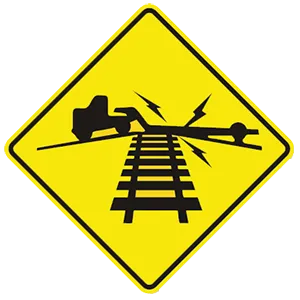Motorcycle Test | License NJ 2026 | FREE Online Practice! #2 Page 4 of 7
Take this FREE motorcycle test (license in NJ 2026) to check your knowledge of the road rules. To improve your results, download a motorcycle handbook online, study theory, and practice for free on our website. Still worried about how to get a motorcycle license in New Jersey in 2026? Check our website for more sample tests, train as much as possible, and boost your grades!
22 . When riding with a passenger, you should:
A motorcycle passenger needs to understand how to ensure a safe ride ride for both themselves and the operator. An operator should never assume the passenger already knows what to do. Give a passenger complete instructions before every ride.
23 . This road sign means:

This sign indicates a low ground railroad crossing. Where this sign is present, railroad tracks cross the road at a steep slope and the bottom of low vehicles may drag or get caught on the tracks.
24 . More than half of all crashes:
More than half of all motorcycle crashes involve riders with less than six months of experience on the motorcycle being used.
25 . When should your rearview mirror be adjusted?
You should clean and adjust both mirrors before starting your motorcycle. Adjust your mirrors so you can see the lane behind you and as much as possible of the lane next to you.
26 . If you are passing a row of cars parked to your right, you should not ride in the right portion of your lane for all of the following reasons, except:
It is usually best to stay in the left portion of your lane when passing a row of parked cars. This position will keep you away from vehicles pulling out unexpectedly, doors being opened, and people exiting or stepping out from between cars.
27 . A helmet should not:
You will get the greatest amount of protection from a helmet if it meets U.S. Department of Transportation (DOT) and state standards, fits snugly all the way around, and has no obvious defects. A helmet worn at the time of a crash should be replaced.
28 . How can you discourage another vehicle from sharing your lane?
To discourage automobile drivers from trying to share your lane, ride in the center portion of the lane.
See the exact questions that will be on the 2026 New Jersey DMV exam.
99.2% of people who use the cheat sheet pass the FIRST TIME
Jeneen was tired of paying $5/gallon. She got herself a scooter that required the motorcycle license. She studyed the motorcycle test cheat sheet and passed her test the next day!
Christopher tells us how he knew nothing prior to obtaining the motorcycle study guide, and he only got one question wrong because he clicked on the wrong answer by mistake.



